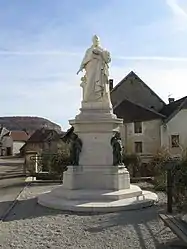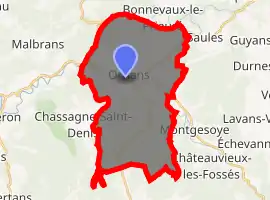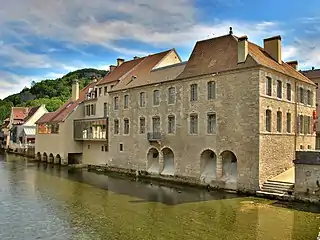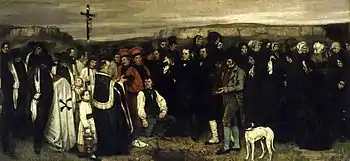Ornans
Ornans is a commune in the Doubs department in the Bourgogne-Franche-Comté region in eastern France. On January 1, 2016, the former commune Bonnevaux-le-Prieuré was merged into Ornans.[2]
Ornans | |
|---|---|
 Statue of Cardinal Antoine Perrenot de Granvelle by Jean Petit, 1897 | |
 Coat of arms | |
Location of Ornans 
| |
 Ornans  Ornans | |
| Coordinates: 47°06′22″N 6°08′38″E | |
| Country | France |
| Region | Bourgogne-Franche-Comté |
| Department | Doubs |
| Arrondissement | Besançon |
| Canton | Ornans |
| Intercommunality | Pays d'Ornans |
| Government | |
| • Mayor (2008–2014) | Jean-François |
| Area 1 | 35.72 km2 (13.79 sq mi) |
| Population (2017-01-01)[1] | 4,295 |
| • Density | 120/km2 (310/sq mi) |
| Time zone | UTC+01:00 (CET) |
| • Summer (DST) | UTC+02:00 (CEST) |
| INSEE/Postal code | 25434 /25290 |
| Elevation | 323–635 m (1,060–2,083 ft) |
| 1 French Land Register data, which excludes lakes, ponds, glaciers > 1 km2 (0.386 sq mi or 247 acres) and river estuaries. | |
Personalities
Ornans is the birthplace of the French realist painter, Gustave Courbet (1819 - 1877). One of Courbet's most famous paintings is Burial at Ornans, which records the burial of his great uncle in September 1848. Courbet's painting depicted actual people who had attended the funeral and were used as models for the painting.
The mathematician and instrument maker Pierre Vernier, for whom the eponymous scale is named, was also a native of this small town (19 August 1580 -14 September 1637).[3] The main avenue of Ornans bears his name, Rue Pierre Vernier. The historical building, l'Hôtel de Granvelle, now designated 67 and 77 Rue Pierre Vernier,[4] was the birthplace of Cardinal Antoine Perrenot de Granvelle (20 August 1517 - 21 September 1586)[5] who was instrumental in the repression of the Protestant Reformation in the Netherlands, under Charles V (called "Charles Quint" in French), Holy Roman Emperor from 1516 to 1556.[6] His father Nicholas Perrenot de Granvelle (1484–1550), had been a chancellor of the empire before him and trusted advisor to Charles V from the time he was elected emperor at 19 years of age.[7] Nicholas (father of 15 children) purchased a building located in the center of the town, and made significant expansions; this became known as L'Hôtel de Granvelle. He groomed his son to assume his advisory position to the Emperor, and to the Pope. In his unique role, and powerful position, it is believed that Antoine was one of the architects of the Counter-Reformation. (i.e. He was charged with addressing the Council of Trent in the name of the emperor (9 Jan., 1543)). "His vast correspondence is an inexhaustible source of information concerning the history of the sixteenth century. It might also be said, writes the celebrated archivist, Gachard, that no minister ever wrote as much as the Cardinal de Granvelle. His correspondence has been edited partly in France by Weiss, "Les papiers d'état de Granvelle" (9 vols., 4to, 1841–52), partly in Belgium, "La correspondence du cardinal Granvelle" (12 vols., 4to, 1878–96), the first three volumes by E. Poullet, the remainder by Ch. Piat."[8]
.JPG.webp) The Loue and the neighborhood of Saint-Laurent
The Loue and the neighborhood of Saint-Laurent.JPG.webp) House along the River Loue
House along the River Loue The Courbet Museum
The Courbet Museum
Population
|
|
| External video | |
|---|---|
 | |
See also
References
- "Populations légales 2017". INSEE. Retrieved 6 January 2020.
- Arrêté préfectoral 6 November 2015 (in French)
- Pierre Vernier
- French Culture Ministry
- http://www.newadvent.org/cathen/06727a.htm
- Antoine Perrenot de Granvelle
- Nicholas Perrenot de Granvelle
- http://www.newadvent.org/cathen/06727a.htm
External links
| Wikimedia Commons has media related to Ornans. |